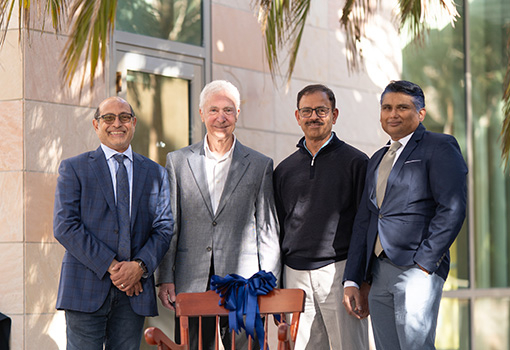Researchers join the Wellcome Leap’s international effort to better understand early biological influences on neurodevelopment.
Featured News

UC Santa Barbara collaborators (left to right) Michelle O’Malley, Ty Vernon, Jean Carlson, and Elaine Kirschke stand in the NSF ExFAB Biofoundry, a state-of-the-art facility central to the university’s newly awarded project.

Roark Chao in the lab at UCSB. Photograph by Matt Perko.
A UCSB doctoral student advised by Stephen DenBaars and Joh Schuller is helping to make it happen.

From left: Umesh Mishra, Frank Koenig, B.S. Manjunath, Luke Theogarajan. Photo by Mia Nie.
ECE professor known for computer vision and neural networks research is honored as one of four endowed chairs in the department.

What if quantum computers could help protect privacy and security? Prabhanjan Ananth is using his new NSF award to find out. Credit: Brian Long, UCSB
Computer science associate professor Prabhanjan Ananth will study the foundations of quantum computing as a cryptographic tool.

Study lead author Asish Ninan Chacko (PhD '26) used the Materials Research Laboratory's MRI machine to develop a new sensor for understanding disease at the molecular level.
UCSB researchers develop a genetic sensor that could allow MRIs to image molecular-level changes.

AI-generated image depicting the advantage of the the carbon- and nitrogen-stable, telecom-ready CN center defect in silicon (right) over the "hydrogen fragile" T Center.
Researchers in Chris Van de Walle’s group discover a more durable defect for quantum applications.

From left: Divy Agrawal, Diba Mirza, Tevfik Bultan. Photograph by James Badham
The program will prepare UCSB graduates to compete and contribute in this broad and rapidly growing field.

Alan Heeger (center) with his wife, Ruth (right), and UCSB chemistry professor and polymer expert Thuc-Quyen Nguyen. Photograph by Matt Perko.
A science-based birthday bash for the materials-chemistry giant who gave us conductive polymers.
